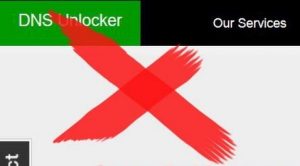 This article has been created in order to help explain what is the DNS Unlocker adware and how to remove DNS Unlocker pop-ups, banners and redirects from your computer.
This article has been created in order to help explain what is the DNS Unlocker adware and how to remove DNS Unlocker pop-ups, banners and redirects from your computer.
It seems as the nasty software, called DNS Unlocker which came out back during the autumn of 2014 has come back to haunt us. The program claims to enable the users who installed it to access the Netflix movie-watching service online so that they can watch their favorite TV shows and other series online from areas from which they cannot typically access the service. Once installed, the DNS Unlocker “virus” is granted as an administrator to modify the DNS (domain name service) settings on your computer under the pretext that it will enable you to access geo-restricted websites, whereas in reality, the software connects to remote hosts and begins advertising an array of third-party websites. Since those advertisements may slow down your computer and lead you to potentially unsafe websites, it is strongly recommended to remove this nasty ad-supported software immediately from your PC, information for which you can find if you read the following article.

Threat Summary
| Name | DNS Unlocker |
| Type | Adware/PUP |
| Short Description | Pretends to be a legitimate program, providing access to restricted sites, but advertises unwanted websites instead.. |
| Symptoms | You may be redirected to web pages with online surveys or other third-party sites, which may slow down your PC or infect it with malware. |
| Distribution Method | Bundled downloads. Web pages which may advertise it. |
| Detection Tool |
See If Your System Has Been Affected by malware
Download
Malware Removal Tool
|
User Experience | Join Our Forum to Discuss DNS Unlocker. |

DNS Unlocker – How Did I Get It
The main method which DNS Unlocker uses is to “hitchhike” the software setups of third-party programs that are offered for free. These programs may be older versions of often used apps, like media players, screen recorders, converters, drivers and many other types of free programs you download for your daily needs. Some software-providing sites aim to spread those programs via installers which they modify in order to advertise other third-party programs “as free extras”. This is not against the law and it is called bundling. However, these sites also bundled programs that may be unwanted on your computer because they are generally unsafe and may lead to more problems, just like the case of DNS Unlocker.
And it is not easy to find DNS Unlocker’s installation prompt either. The program’s install step may often reside in the “Custom” or “Advanced” installation mode of the setup pretending to be one of those free extras, similar to what the image below shows:
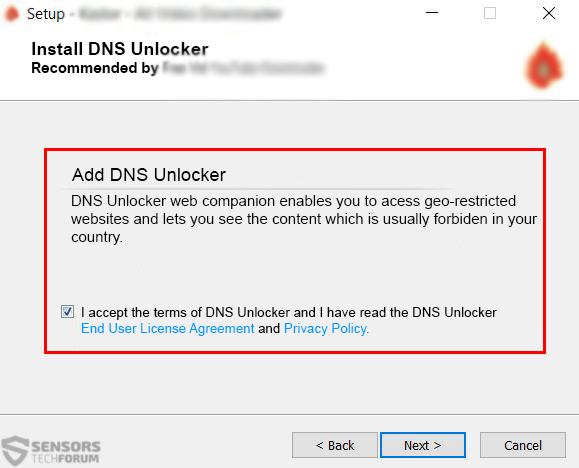
Since DNS Unlocker can be found very difficult on your computer, in order to protect yourself in the future against bundled programs, like itself it is often recommended to check the software license agreements for shady prompts to install third-party software, using free programs, like EULAlyzer, or carefully go through the installation steps.

DNS Unlocker – Complete Analysis
Once DNS Unlocker has been added to your computer, the adware may act as a legitimate program, thus preventing conventional antivirus programs from blocking the files it drops on your PC. The files which are initially dropped are located in the %Program Files% directory, in a folder, called DNS Unlocker. Their names are often changed, but the main support files are named as the following:
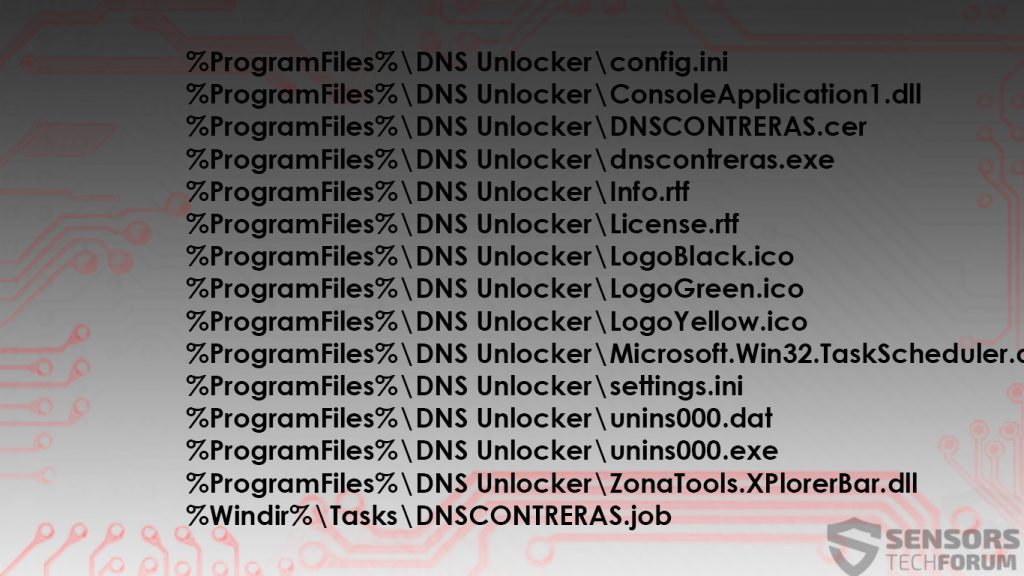
Once it has been recognized by your computer as a legitimate program, DNS Unlocker begins to modify your PC, by creating different registry entries, reported by Symantec(https://symantec.com/) to be the following:
→ HKEY_LOCAL_MACHINE\SOFTWARE\ {alpha-numerical-value-here}
HKEY_LOCAL_MACHINE\SYSTEM\ControlSet001\Services\Dhcp\Parameters\”{alpha-numerical-value-here}” = {Hexidecimal Value}
After it has dropped it’s files on your computer, the program alters your DNS address in the network configuration settings of your active network adapter with it’s own IP addresses, reported by researchers at Bleeping Computer to be the following:
→ 82.163.143.157
82.163.142.159
82.163.142.185
82.163.143.185
Once DNS Unlocker has done this, it becomes very difficult for users to remove the program, because even after you make sure to get rid of the program, your DNS settings may still remain changed and the virus uses them to connect to those remote hosts and display the following types of ads directly on your desktop:
- Pop-ups.
- Browser Redirections.
- Ad-supported search results.
- Banners on the websites you visit.
The advertisements often appear with the brand “Ad by DNS Unlocker” or “Ads by DNS Unlocker” or simply “DNS Unlocker Ad”. They often advertise retailers with low reputation:
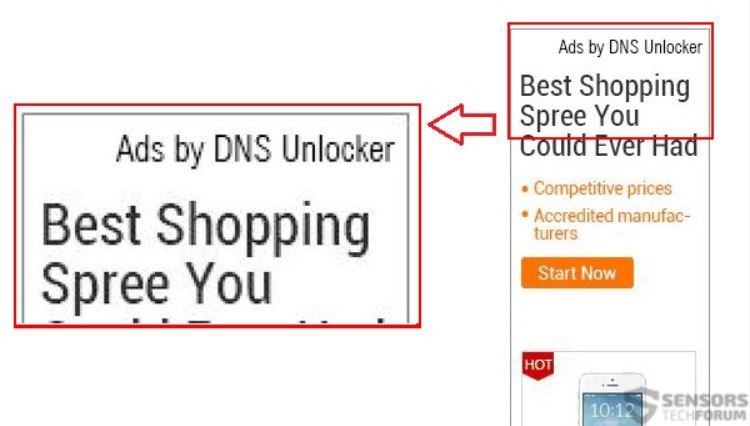
These advertisements often tend to lead victims to third-party websites, the main risk associated with which may not be that they may offer higher prices than your average online retailer. Some of those sites tend to be completely fake and may make you conduct a payment or simply may use cookies and other tracking technologies to gather financial information from your computer system. Such are often:
- Cookies.
- Pixels.
- Tags.
- Geo-Locators.
- LSOs.
These can be used to collect different type of information from your computer, like the following:
- Your web browsing history.
- Online clicks.
- What you have searched for online.
This data may be used by DNS Unlocker’s creators for different purposes and as their website claims, it can be shared with third-parties:
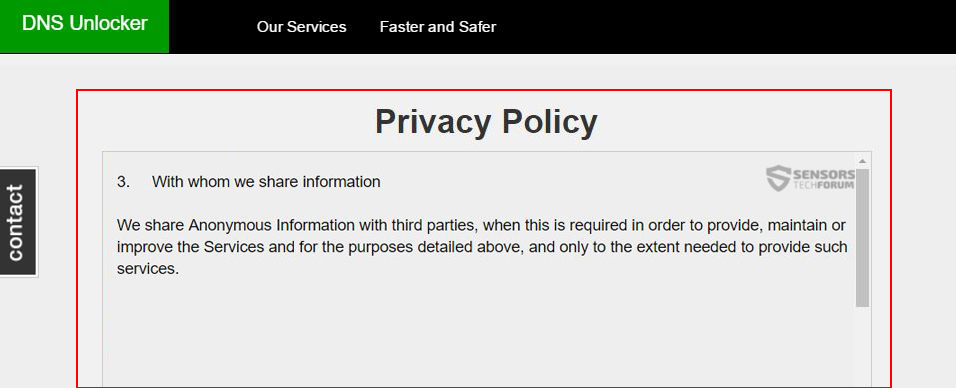
Since the websites to which the advertisements shown by DNS Unlocker can lead you to may be unsafe, it is strongly recommended to remove this indirect threat from your computer immediately.

How Do I Remove the DNS Unlocker Adware Fully
A conventional deletion of this program may not work for you and may not be able to delete DNS Unlocker or change your DNS setttings. This is why, what we urge you is to take more advanced steps towards a permanent solution of this problem. Such is to follow the manual or the automatic removal instructions underneath this article. If you lack the experience in manually removing unwanted programs and the objects related to them, like DNS Unlocker, we recommend you to automatically scan for and delete all of the objects changed by this program, preferably by using an advanced anti-malware software. Such tool has the capability to fully eradicate DNS Unocker from your PC and make sure that your computer stays safe in the future as well.
In addition to the instructions underneath you will need to revert your DNS settings after removing DNS Unlocker. This can happen if you follow the after mentioned steps:
Step 1: Open Control Panel.
Step 2: Go to Network and Internet.
Step 3: Under Network Sharing, click on “View Network Status and Tasks”.
Step 4: Click on the “Change Adapter Settings” in the top left of your screen.
Step 5: Right-click on your Wi-Fi network and then click Properties.
Step 6: Go to Internet Protocol Version 4 (TCP/IPv4) or if you have IPV6 to the version 6 one. Mark it with your mouse and then click on Properties underneath it.
Step 7: On DNS Address, click on “Obtain DNS server address automatically”.

Step 8: Follow the removal instructions below or the instructions in this video to fully delete DNS Unlocker and make sure it doesn’t come back.
- Windows
- Mac OS X
- Google Chrome
- Mozilla Firefox
- Microsoft Edge
- Safari
- Internet Explorer
- Stop Push Pop-ups
How to Remove DNS Unlocker from Windows.
Step 1: Scan for DNS Unlocker with SpyHunter Anti-Malware Tool
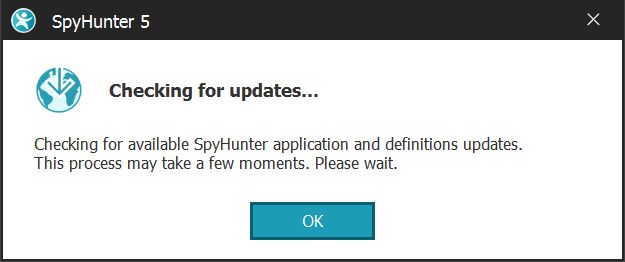
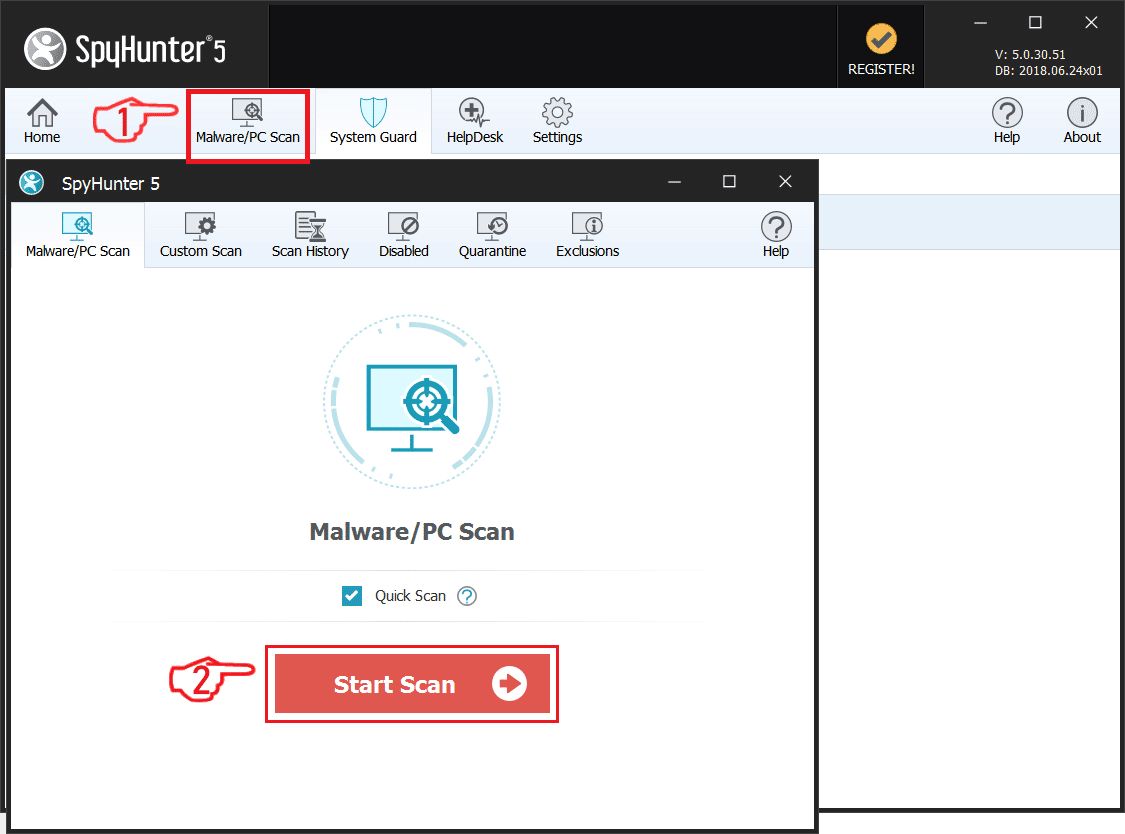
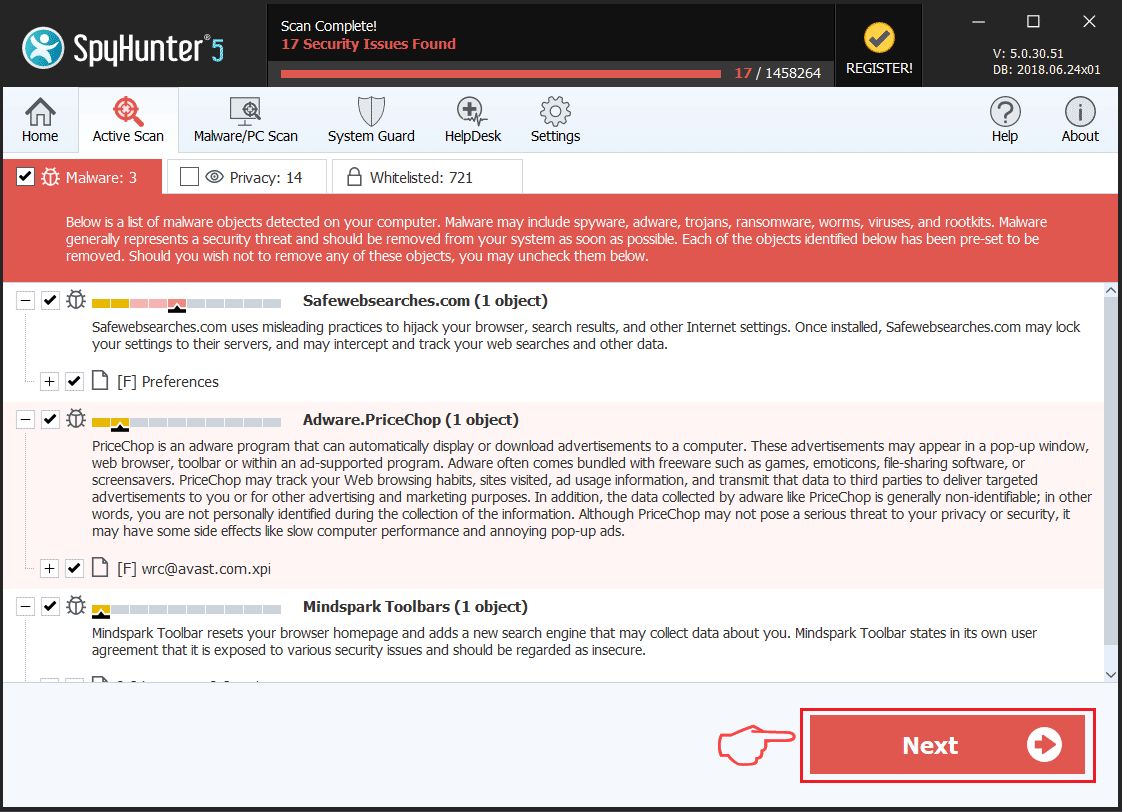
Step 2: Boot Your PC In Safe Mode

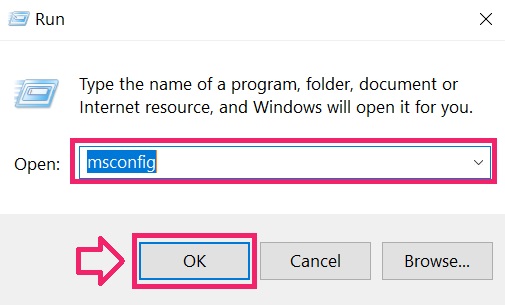
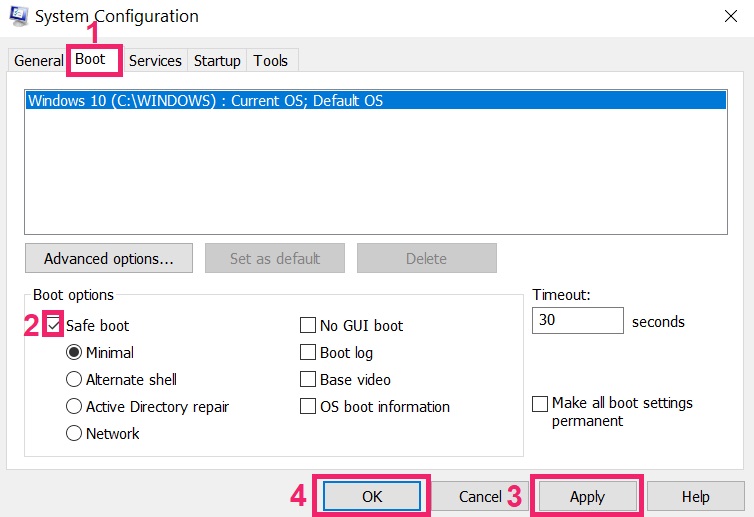
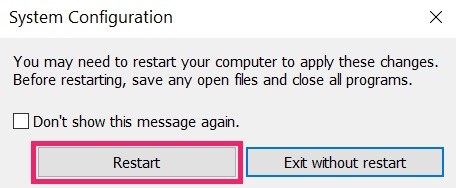
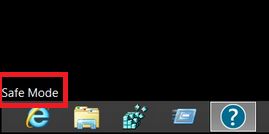
Step 3: Uninstall DNS Unlocker and related software from Windows
Uninstall Steps for Windows 11
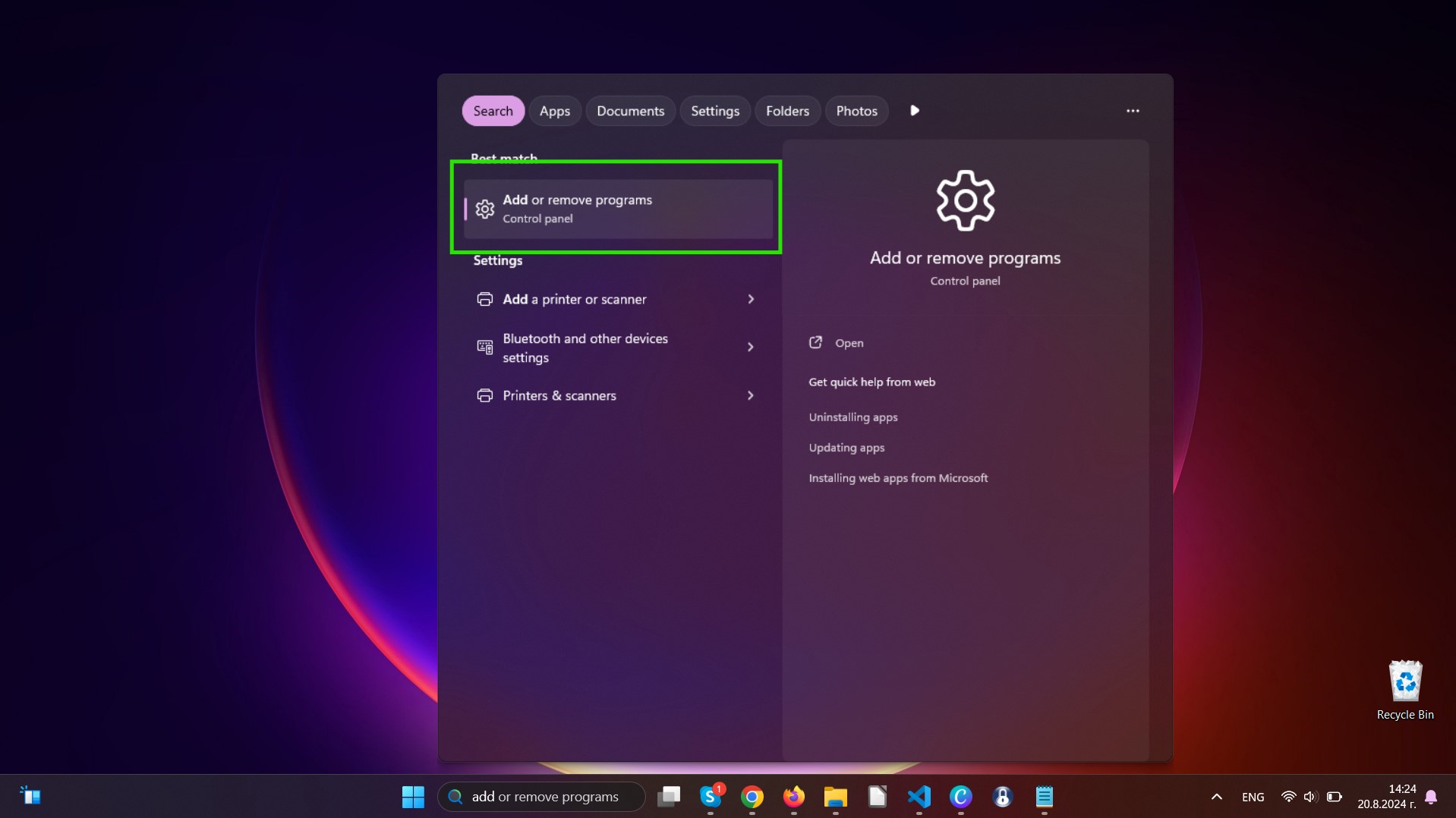
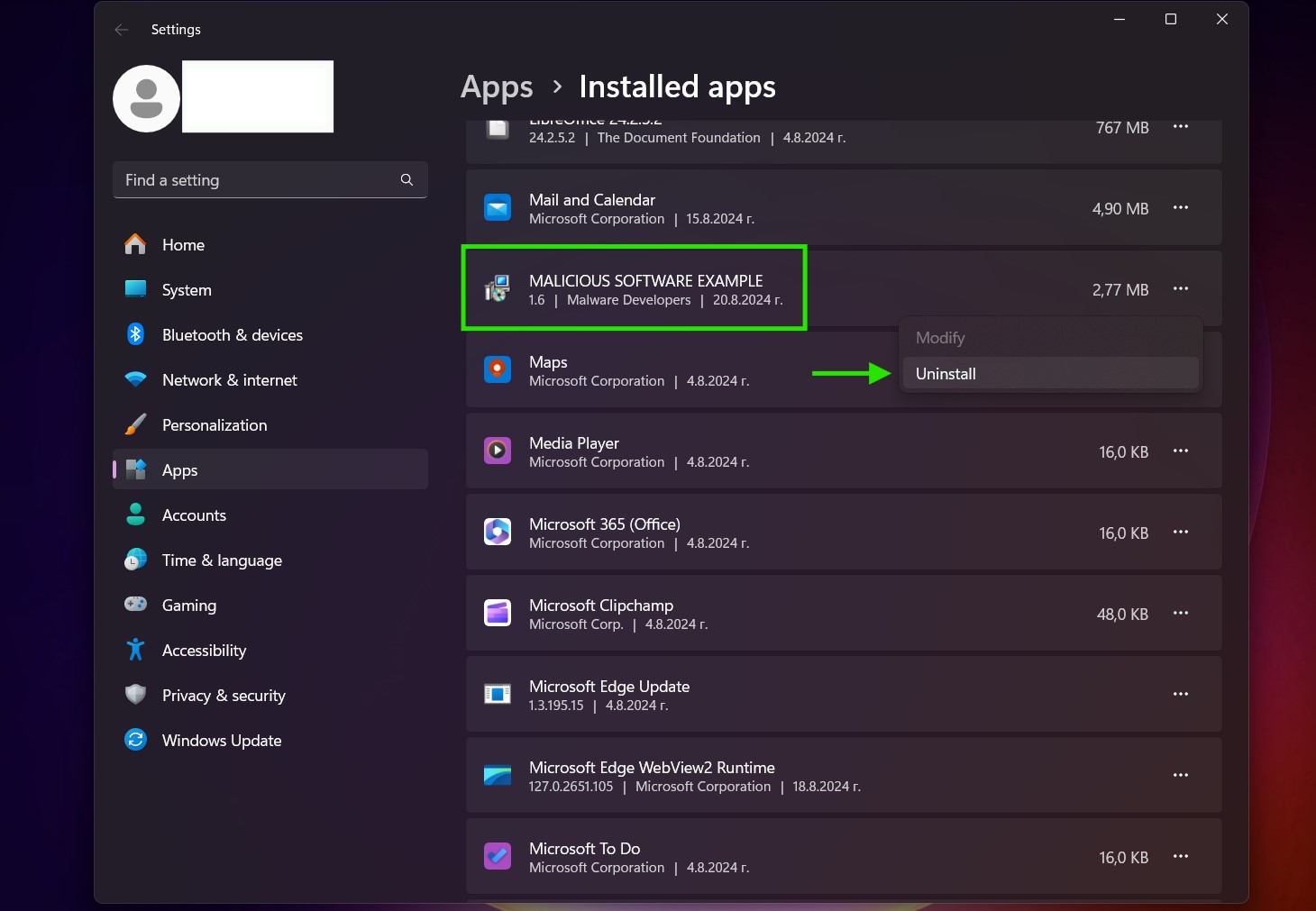
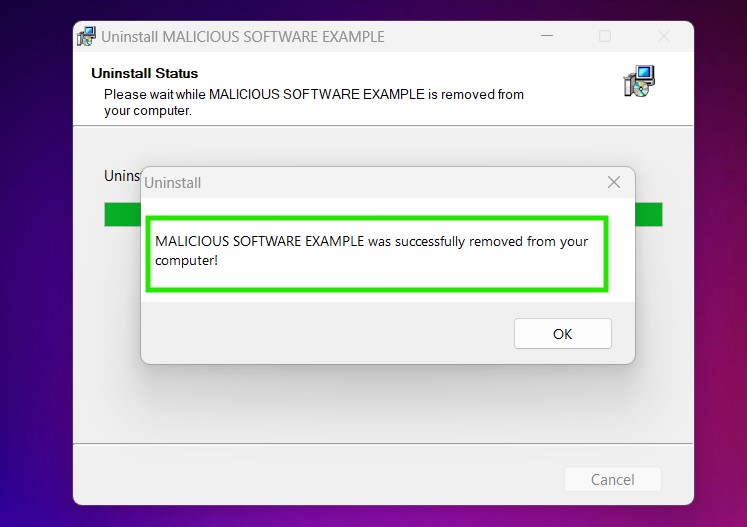
Uninstall Steps for Windows 10 and Older Versions
Here is a method in few easy steps that should be able to uninstall most programs. No matter if you are using Windows 10, 8, 7, Vista or XP, those steps will get the job done. Dragging the program or its folder to the recycle bin can be a very bad decision. If you do that, bits and pieces of the program are left behind, and that can lead to unstable work of your PC, errors with the file type associations and other unpleasant activities. The proper way to get a program off your computer is to Uninstall it. To do that:

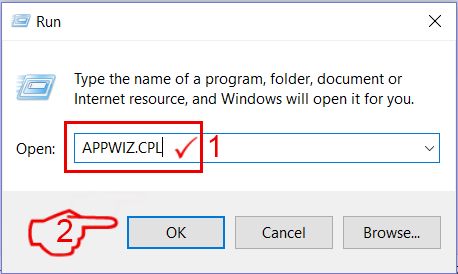
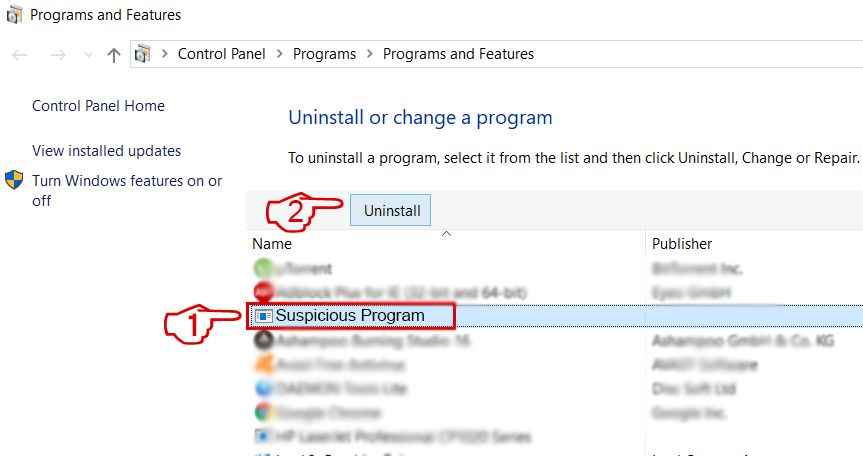 Follow the instructions above and you will successfully uninstall most programs.
Follow the instructions above and you will successfully uninstall most programs.
Step 4: Clean Any registries, Created by DNS Unlocker on Your PC.
The usually targeted registries of Windows machines are the following:
- HKEY_LOCAL_MACHINE\Software\Microsoft\Windows\CurrentVersion\Run
- HKEY_CURRENT_USER\Software\Microsoft\Windows\CurrentVersion\Run
- HKEY_LOCAL_MACHINE\Software\Microsoft\Windows\CurrentVersion\RunOnce
- HKEY_CURRENT_USER\Software\Microsoft\Windows\CurrentVersion\RunOnce
You can access them by opening the Windows registry editor and deleting any values, created by DNS Unlocker there. This can happen by following the steps underneath:
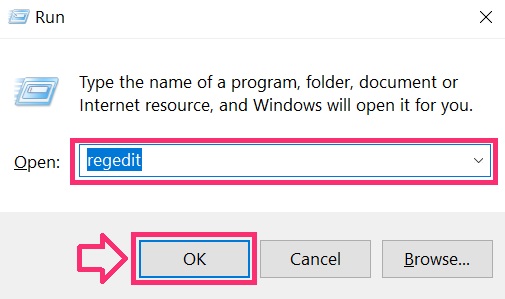

 Tip: To find a virus-created value, you can right-click on it and click "Modify" to see which file it is set to run. If this is the virus file location, remove the value.
Tip: To find a virus-created value, you can right-click on it and click "Modify" to see which file it is set to run. If this is the virus file location, remove the value.
Video Removal Guide for DNS Unlocker (Windows).
Get rid of DNS Unlocker from Mac OS X.
Step 1: Uninstall DNS Unlocker and remove related files and objects
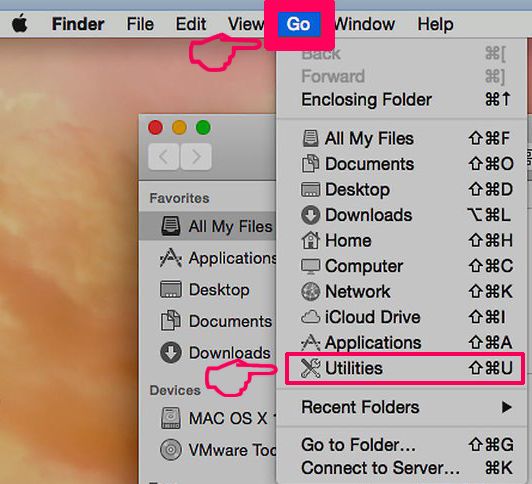
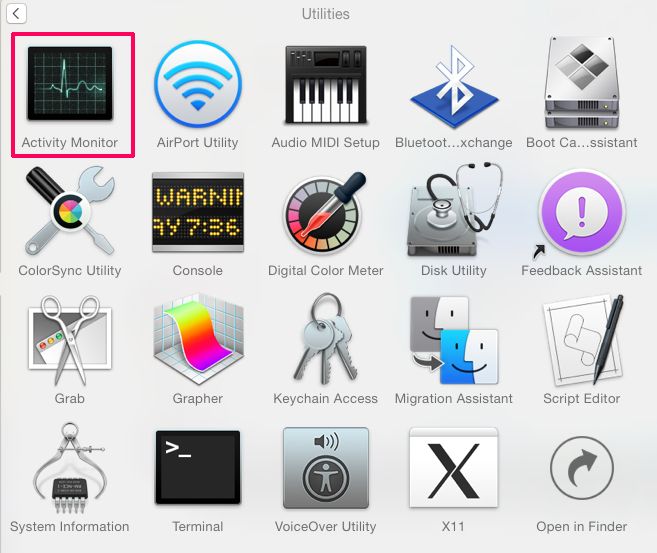
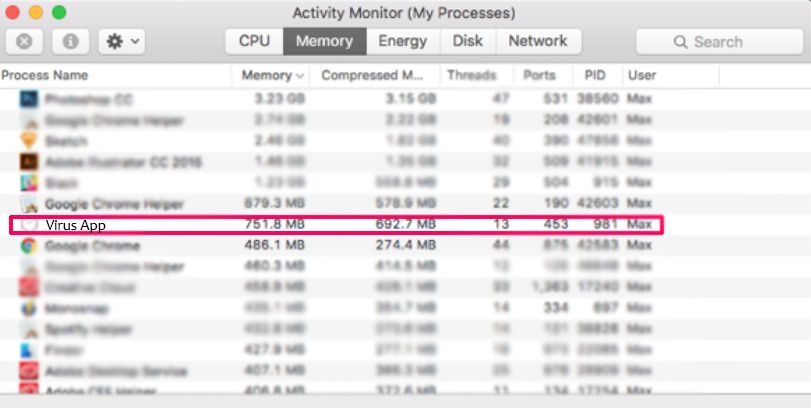
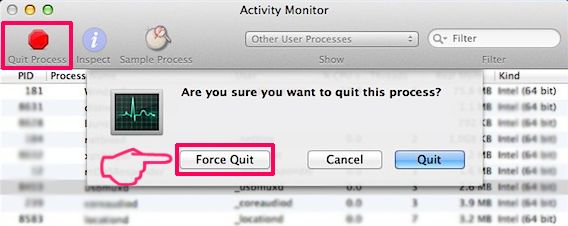
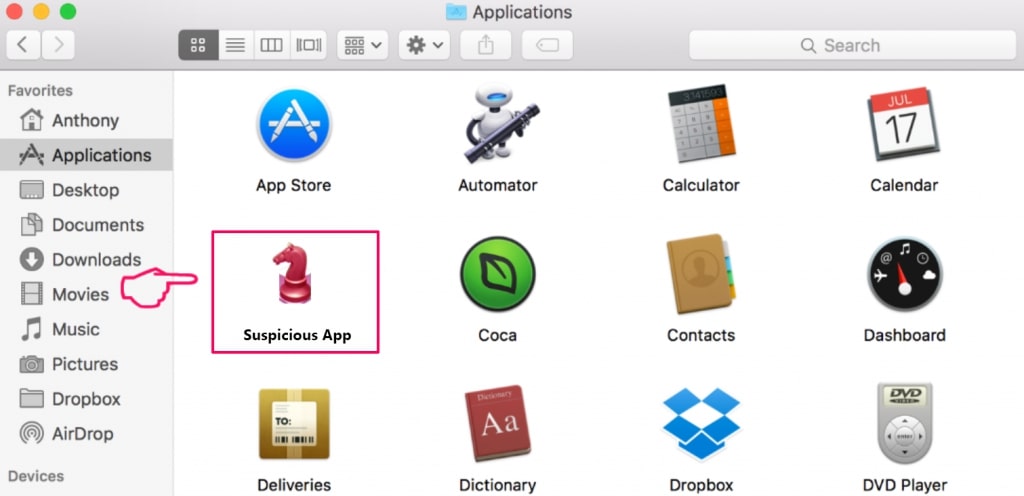
Your Mac will then show you a list of items that start automatically when you log in. Look for any suspicious apps identical or similar to DNS Unlocker. Check the app you want to stop from running automatically and then select on the Minus (“-“) icon to hide it.
- Go to Finder.
- In the search bar type the name of the app that you want to remove.
- Above the search bar change the two drop down menus to “System Files” and “Are Included” so that you can see all of the files associated with the application you want to remove. Bear in mind that some of the files may not be related to the app so be very careful which files you delete.
- If all of the files are related, hold the ⌘+A buttons to select them and then drive them to “Trash”.
In case you cannot remove DNS Unlocker via Step 1 above:
In case you cannot find the virus files and objects in your Applications or other places we have shown above, you can manually look for them in the Libraries of your Mac. But before doing this, please read the disclaimer below:
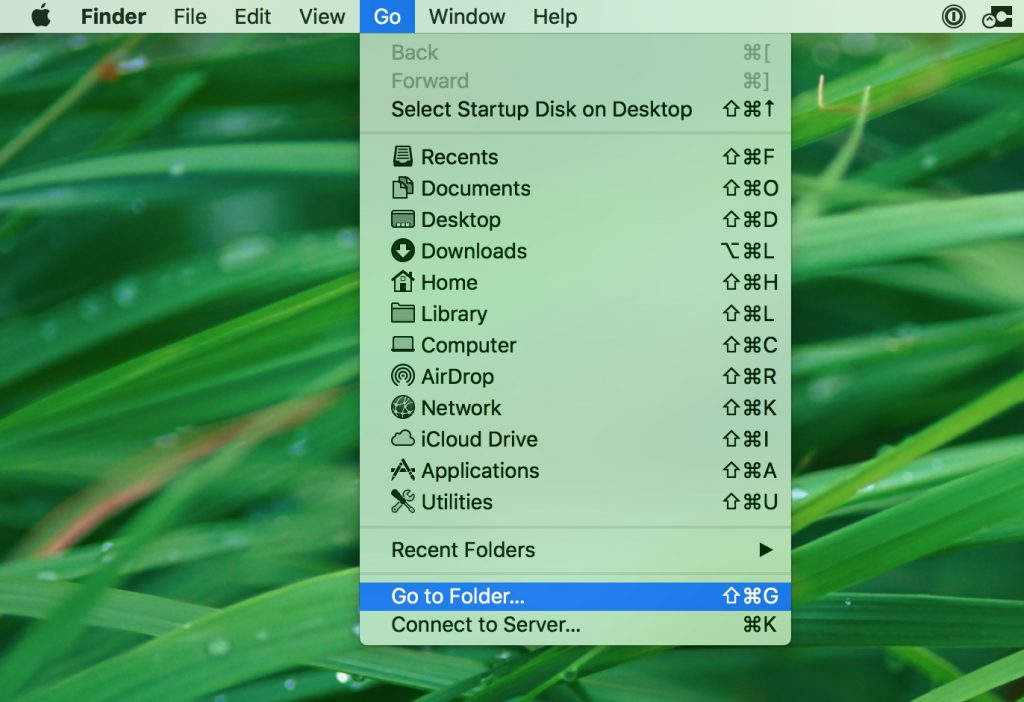
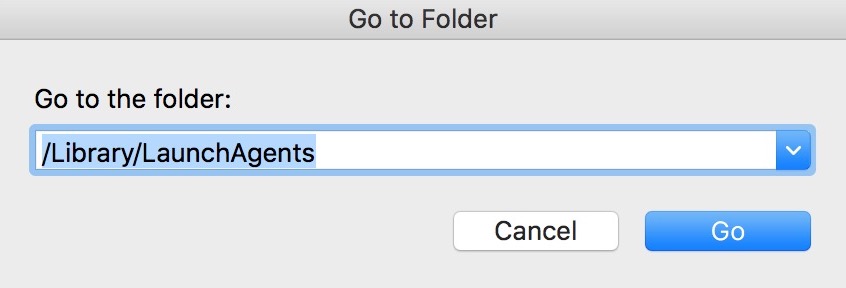
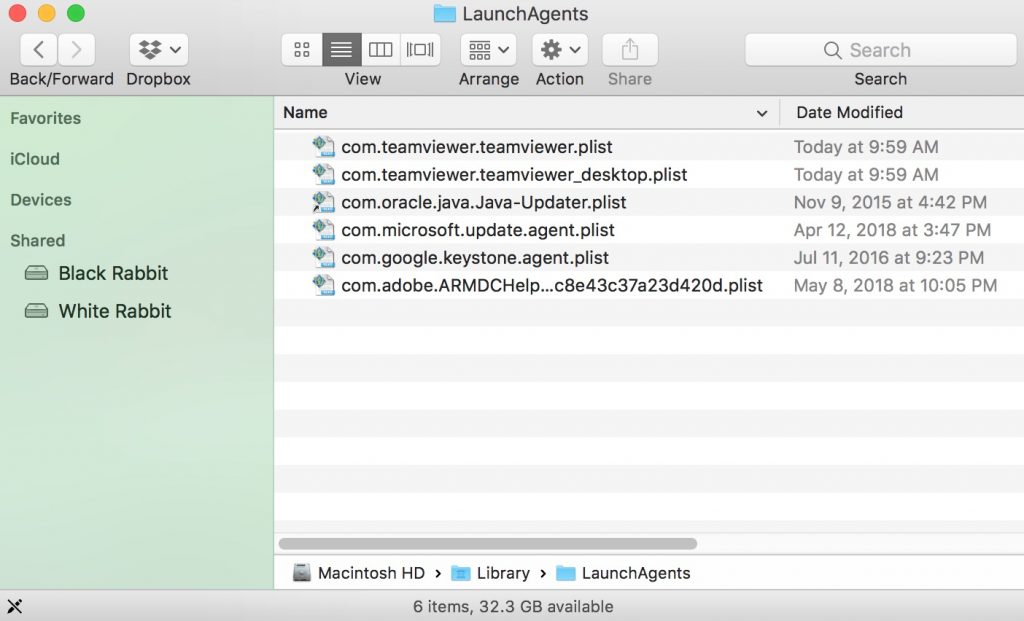
You can repeat the same procedure with the following other Library directories:
→ ~/Library/LaunchAgents
/Library/LaunchDaemons
Tip: ~ is there on purpose, because it leads to more LaunchAgents.
Step 2: Scan for and remove DNS Unlocker files from your Mac
When you are facing problems on your Mac as a result of unwanted scripts and programs such as DNS Unlocker, the recommended way of eliminating the threat is by using an anti-malware program. SpyHunter for Mac offers advanced security features along with other modules that will improve your Mac’s security and protect it in the future.
Video Removal Guide for DNS Unlocker (Mac)
Remove DNS Unlocker from Google Chrome.
Step 1: Start Google Chrome and open the drop menu
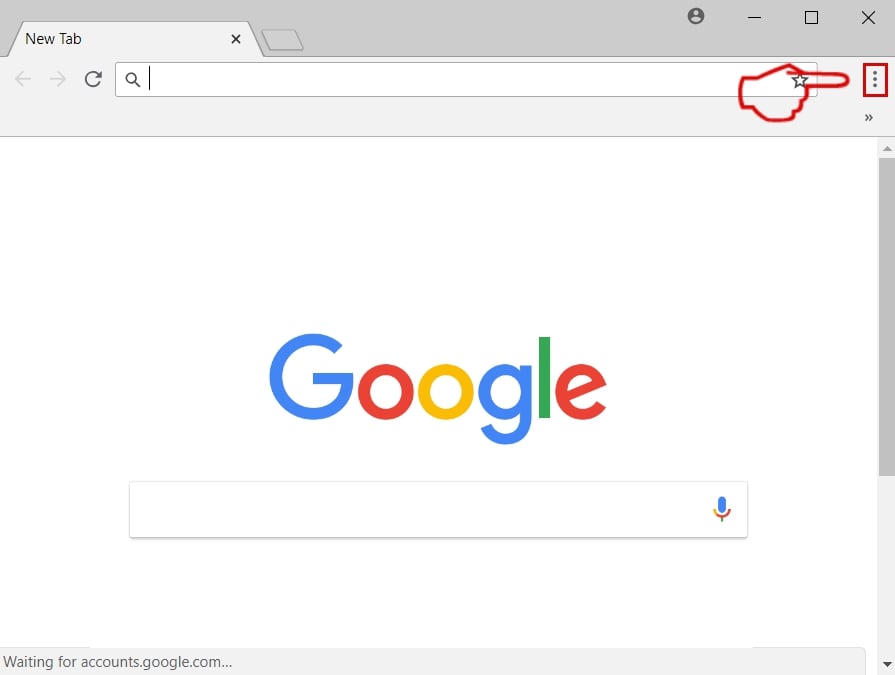
Step 2: Move the cursor over "Tools" and then from the extended menu choose "Extensions"
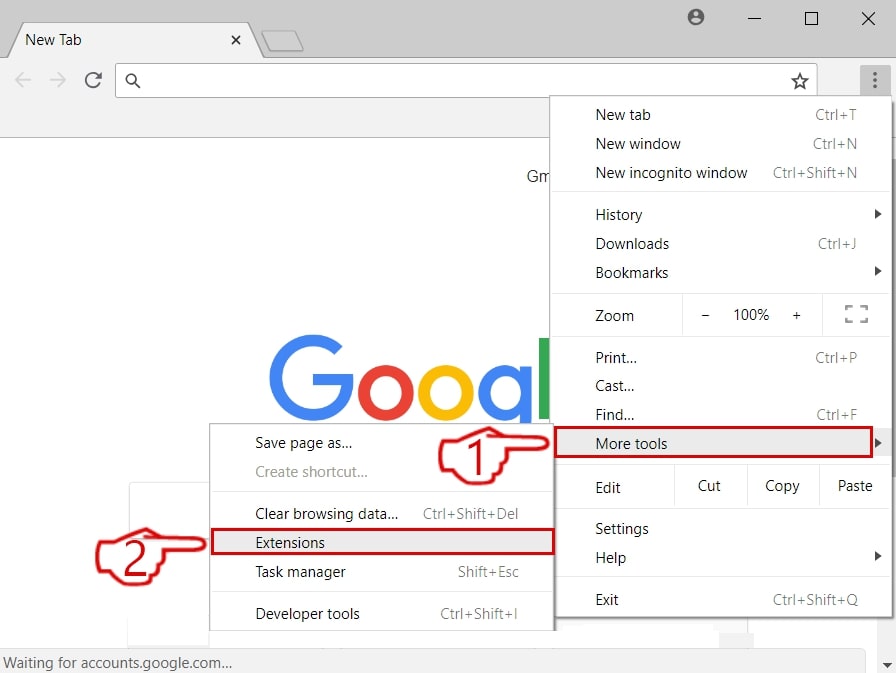
Step 3: From the opened "Extensions" menu locate the unwanted extension and click on its "Remove" button.
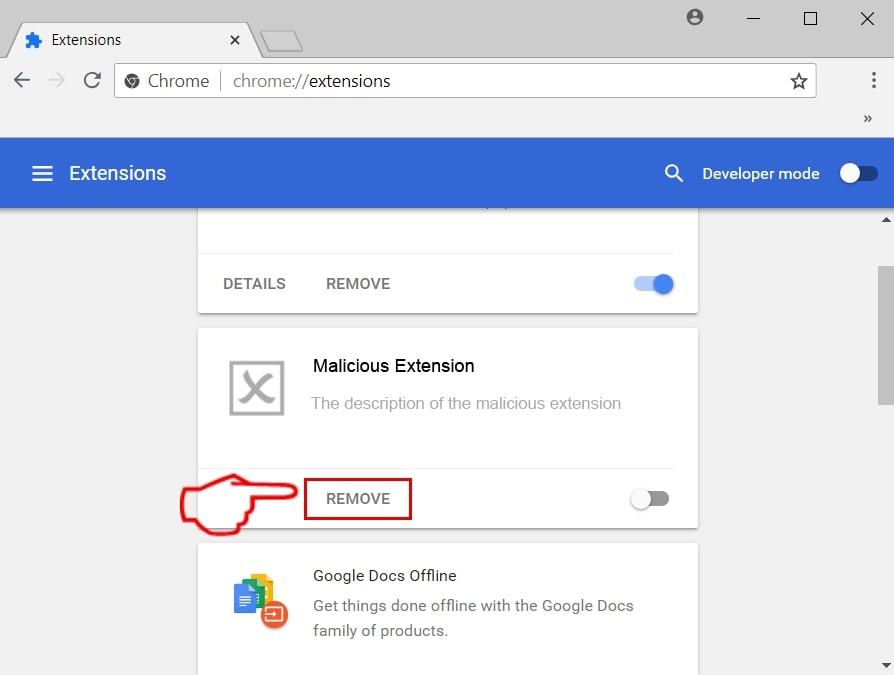
Step 4: After the extension is removed, restart Google Chrome by closing it from the red "X" button at the top right corner and start it again.
Erase DNS Unlocker from Mozilla Firefox.
Step 1: Start Mozilla Firefox. Open the menu window:
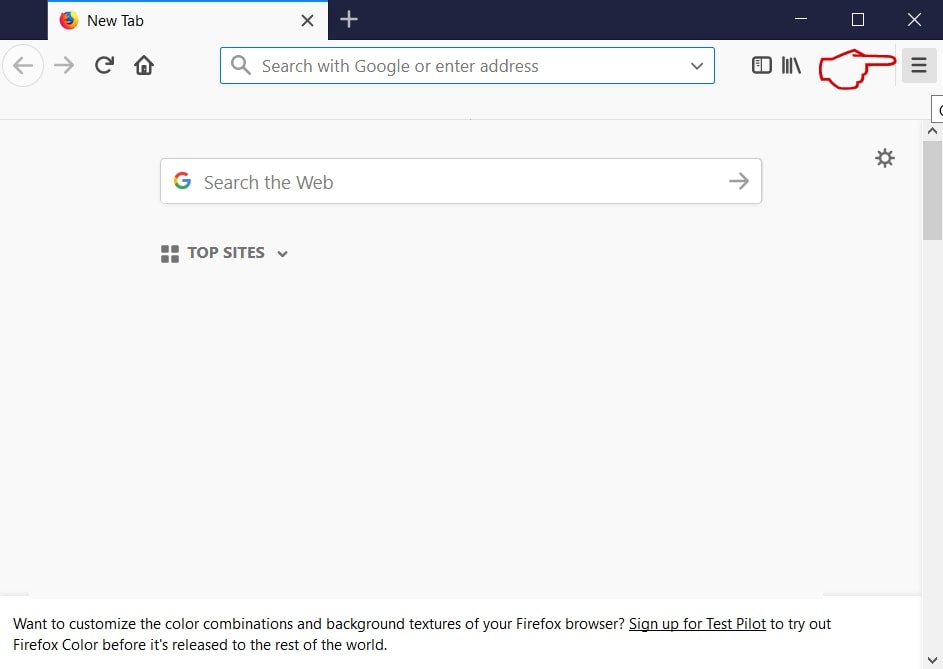
Step 2: Select the "Add-ons" icon from the menu.
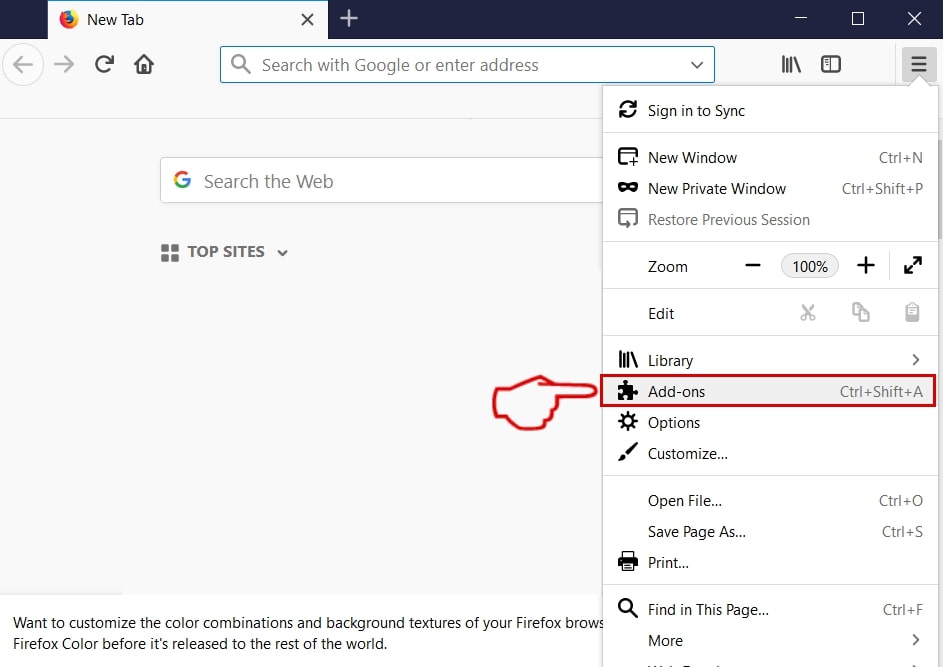
Step 3: Select the unwanted extension and click "Remove"

Step 4: After the extension is removed, restart Mozilla Firefox by closing it from the red "X" button at the top right corner and start it again.
Uninstall DNS Unlocker from Microsoft Edge.
Step 1: Start Edge browser.
Step 2: Open the drop menu by clicking on the icon at the top right corner.
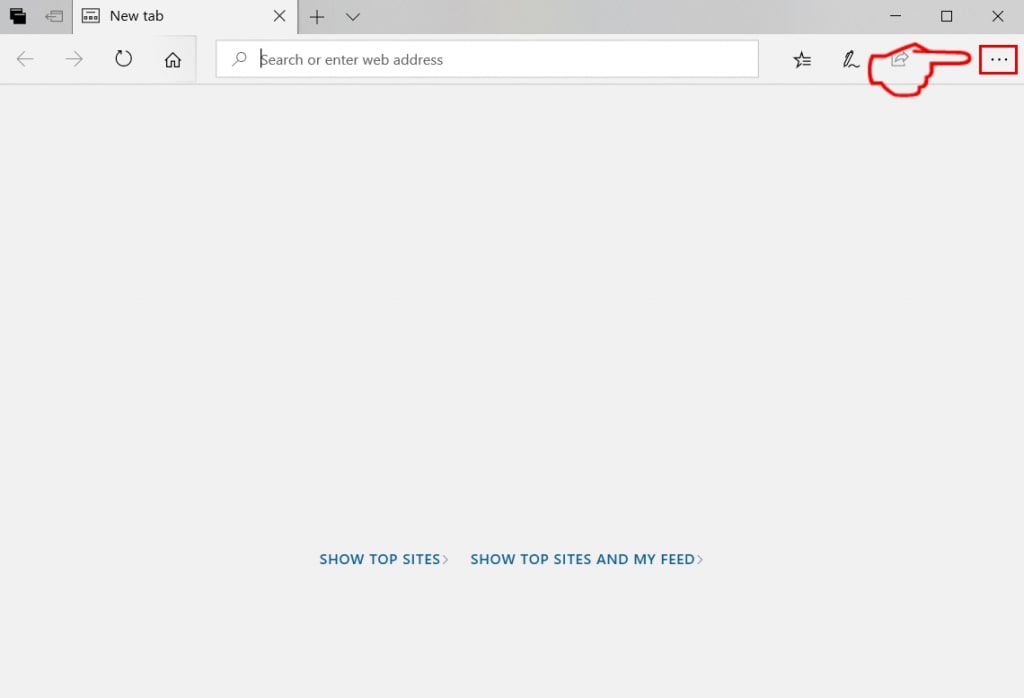
Step 3: From the drop menu select "Extensions".
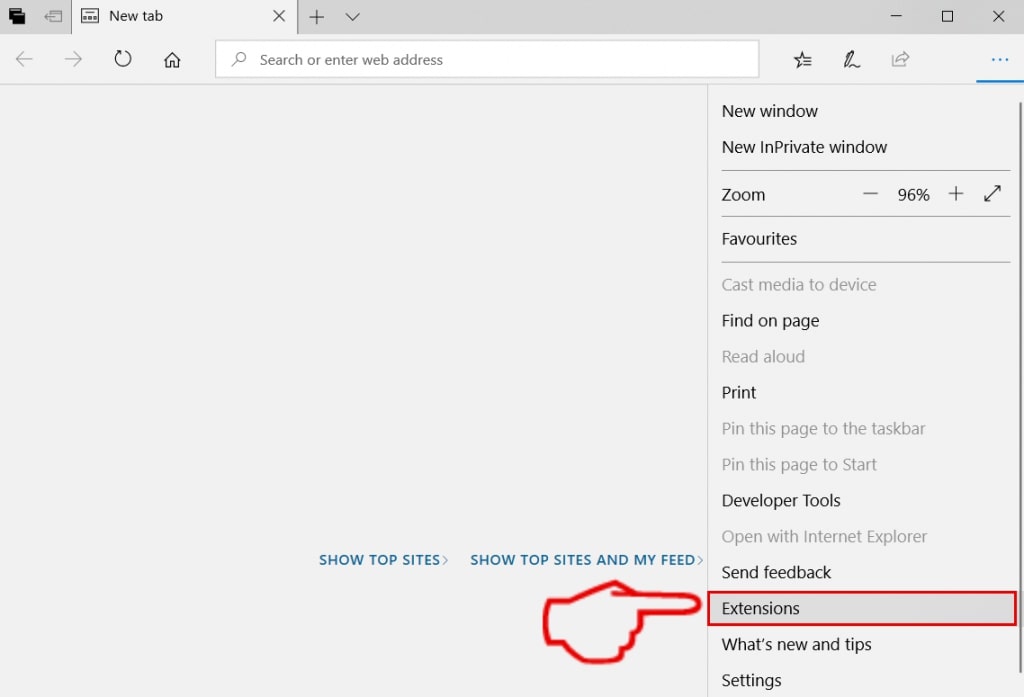
Step 4: Choose the suspected malicious extension you want to remove and then click on the gear icon.
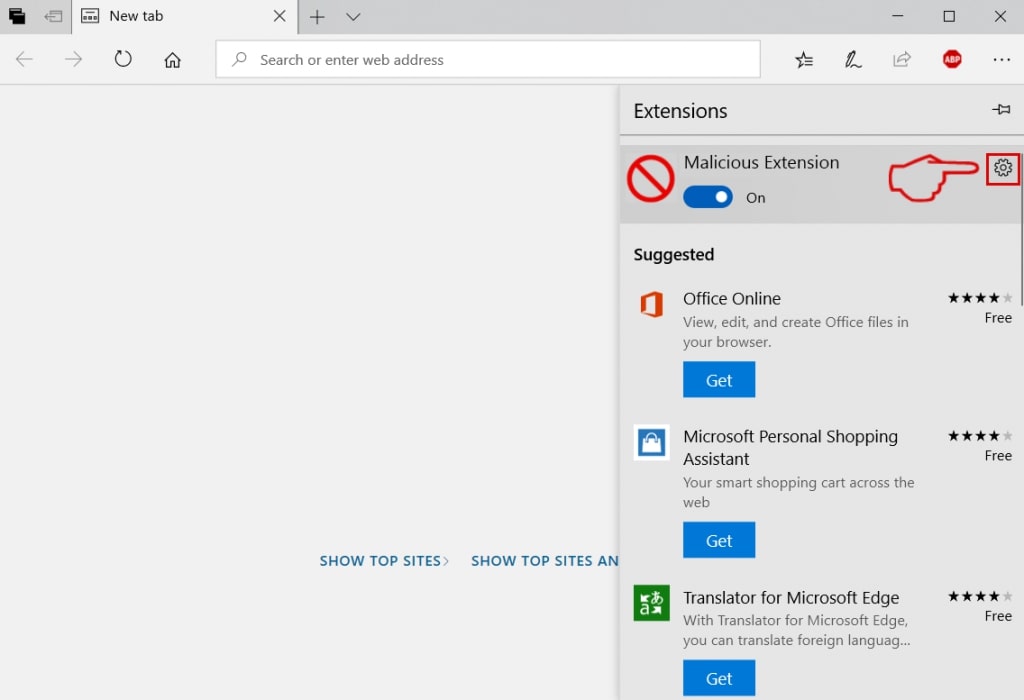
Step 5: Remove the malicious extension by scrolling down and then clicking on Uninstall.
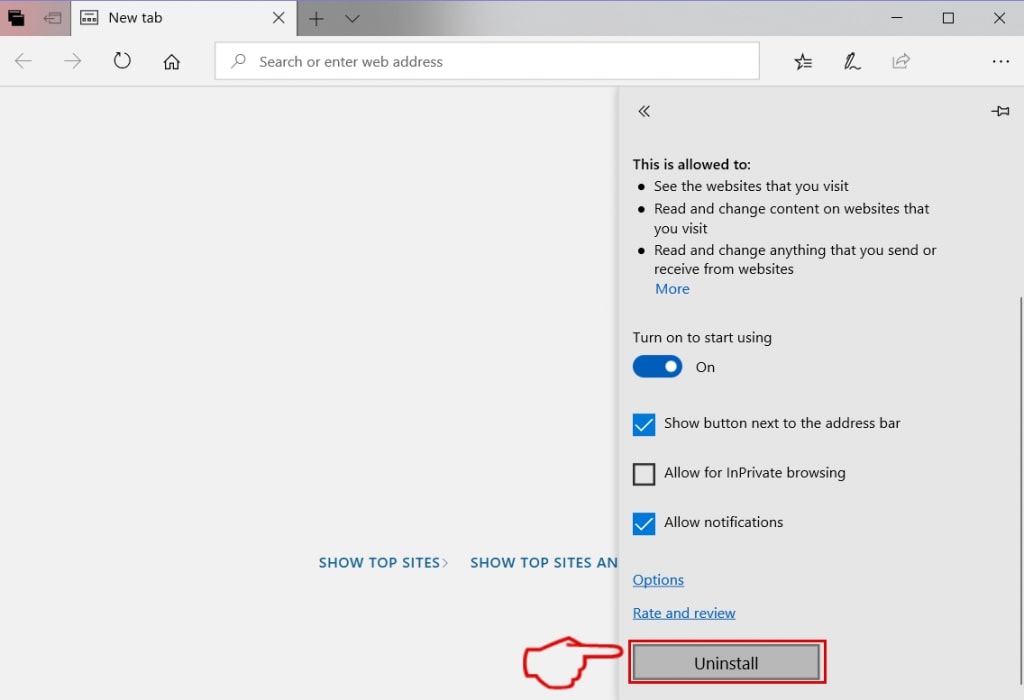
Remove DNS Unlocker from Safari
Step 1: Start the Safari app.
Step 2: After hovering your mouse cursor to the top of the screen, click on the Safari text to open its drop down menu.
Step 3: From the menu, click on "Preferences".
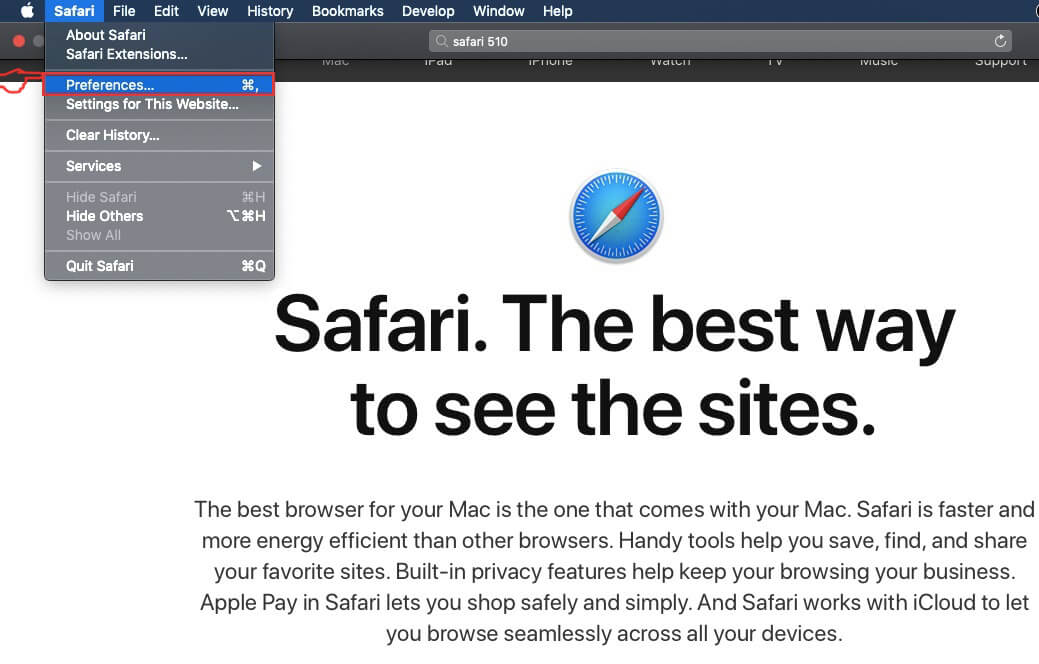
Step 4: After that, select the 'Extensions' Tab.

Step 5: Click once on the extension you want to remove.
Step 6: Click 'Uninstall'.
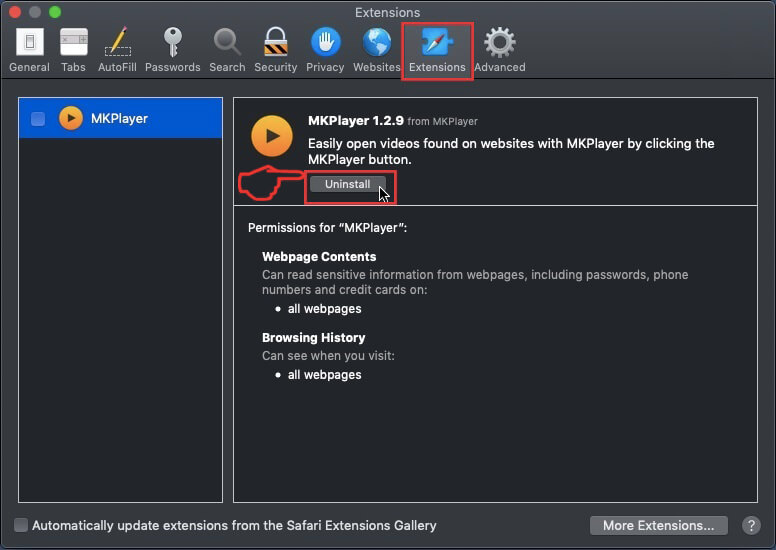
A pop-up window will appear asking for confirmation to uninstall the extension. Select 'Uninstall' again, and the DNS Unlocker will be removed.
Eliminate DNS Unlocker from Internet Explorer.
Step 1: Start Internet Explorer.
Step 2: Click on the gear icon labeled 'Tools' to open the drop menu and select 'Manage Add-ons'
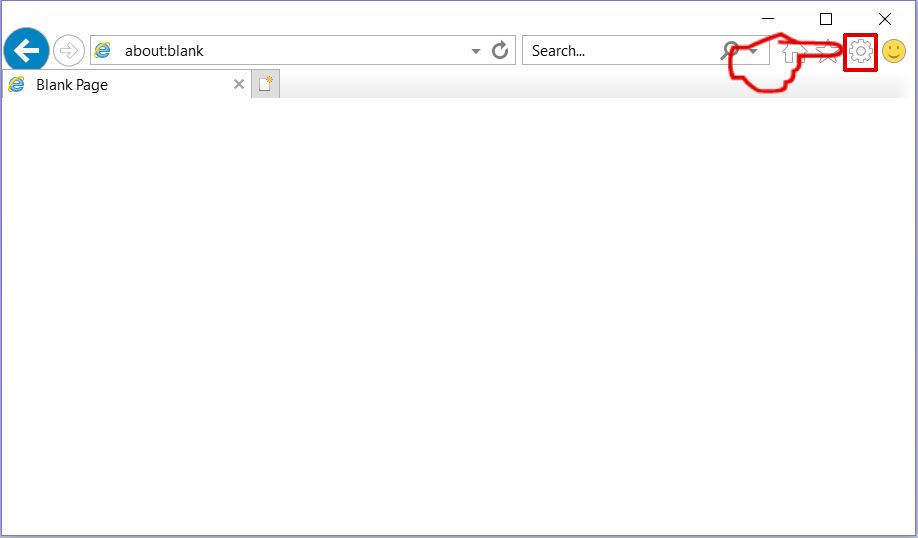
Step 3: In the 'Manage Add-ons' window.
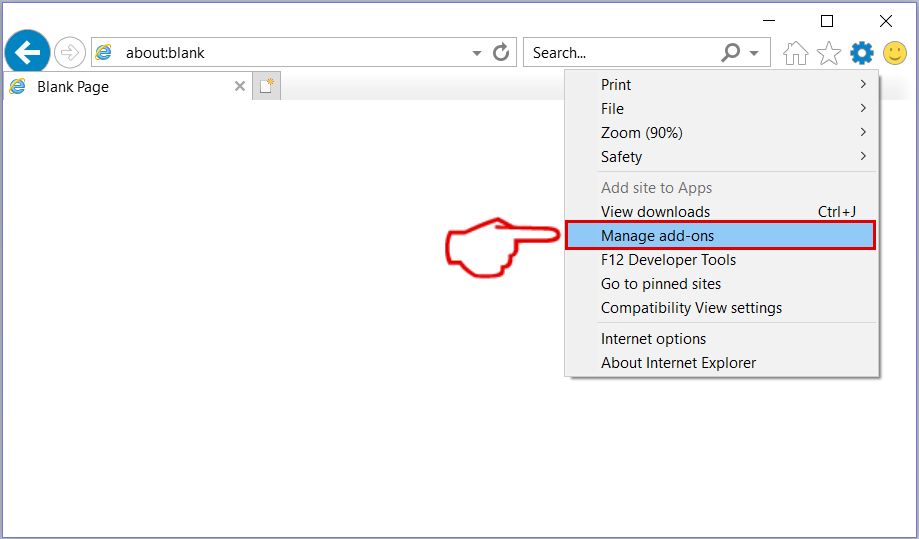
Step 4: Select the extension you want to remove and then click 'Disable'. A pop-up window will appear to inform you that you are about to disable the selected extension, and some more add-ons might be disabled as well. Leave all the boxes checked, and click 'Disable'.
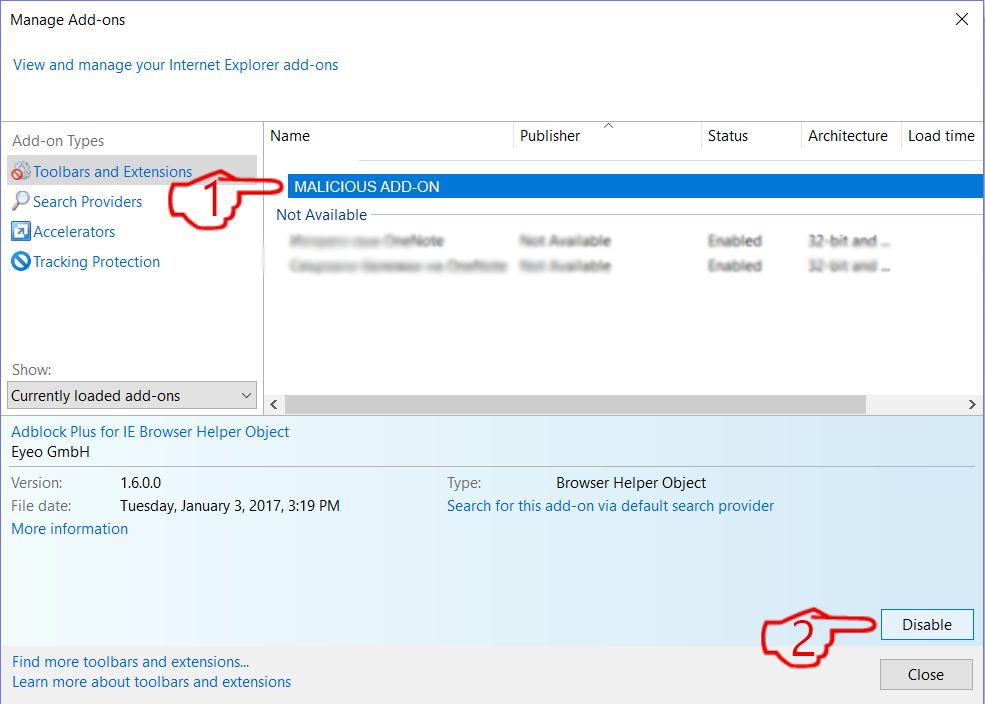
Step 5: After the unwanted extension has been removed, restart Internet Explorer by closing it from the red 'X' button located at the top right corner and start it again.
Remove Push Notifications from Your Browsers
Turn Off Push Notifications from Google Chrome
To disable any Push Notices from Google Chrome browser, please follow the steps below:
Step 1: Go to Settings in Chrome.
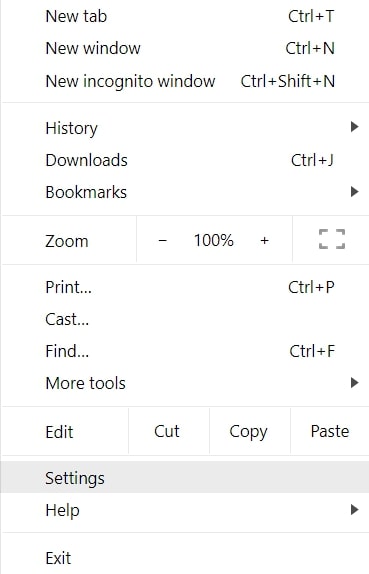
Step 2: In Settings, select “Advanced Settings”:
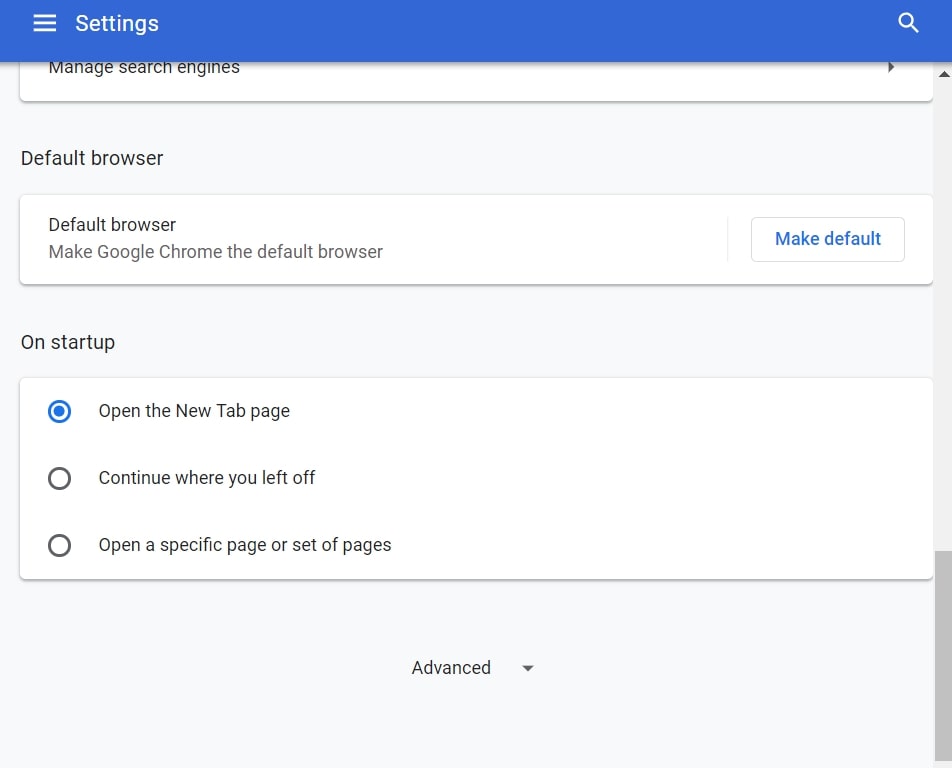
Step 3: Click “Content Settings”:
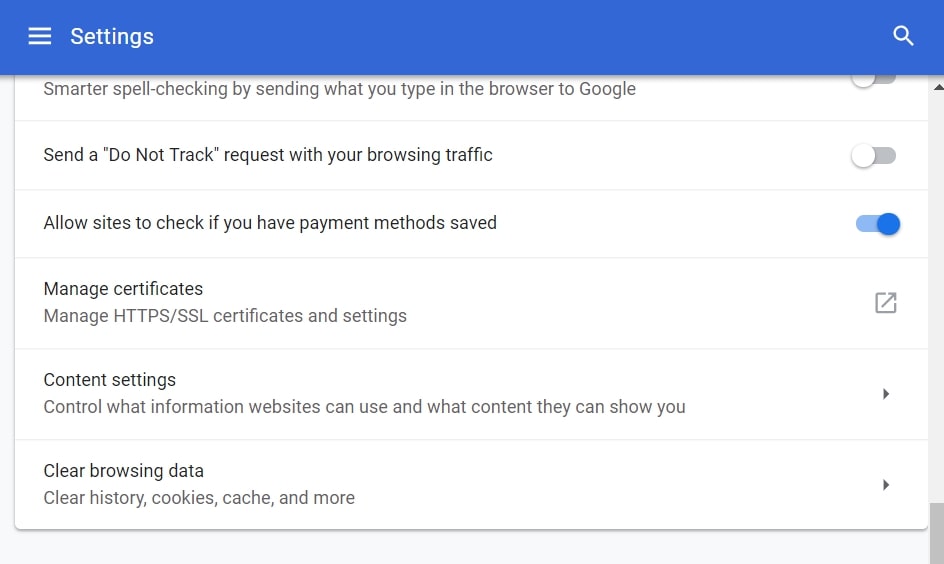
Step 4: Open “Notifications”:
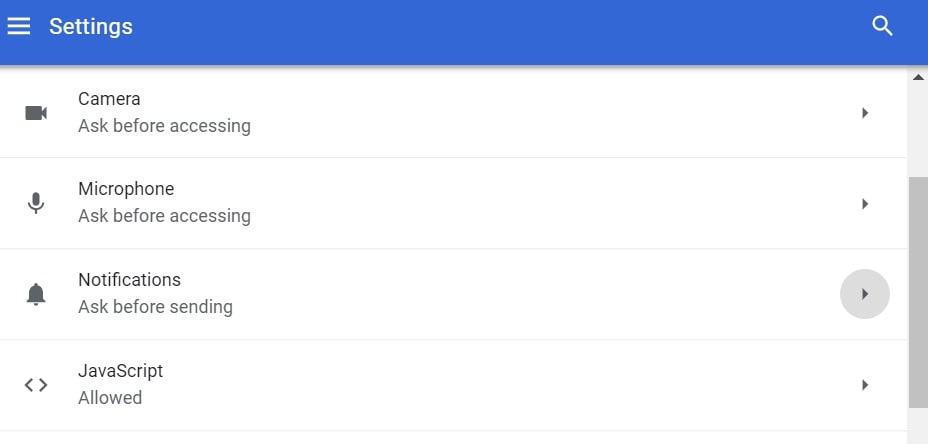
Step 5: Click the three dots and choose Block, Edit or Remove options:

Remove Push Notifications on Firefox
Step 1: Go to Firefox Options.
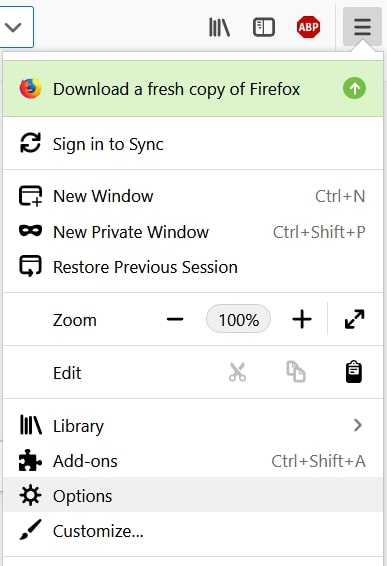
Step 2: Go to “Settings”, type “notifications” in the search bar and click "Settings":
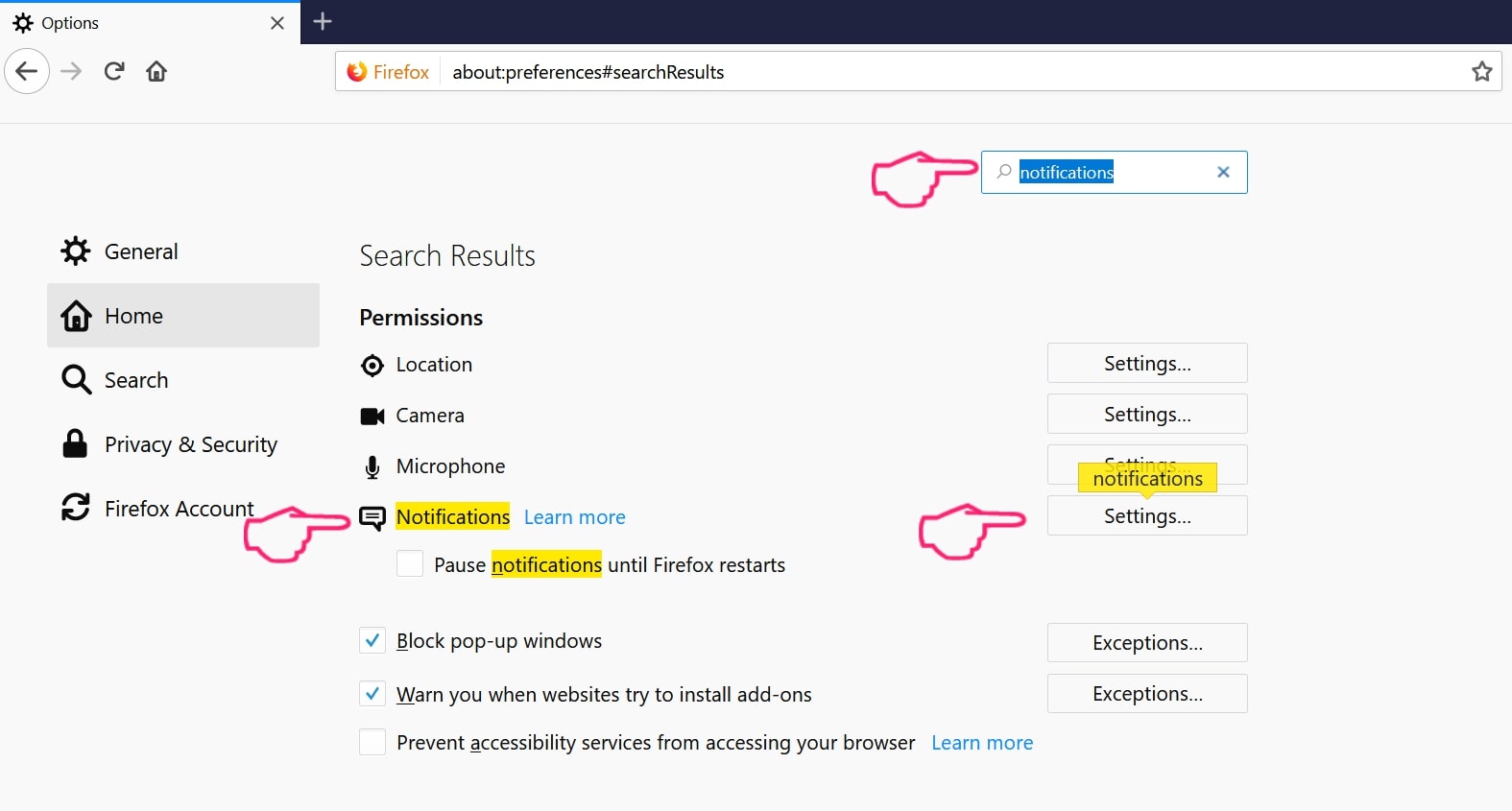
Step 3: Click “Remove” on any site you wish notifications gone and click “Save Changes”
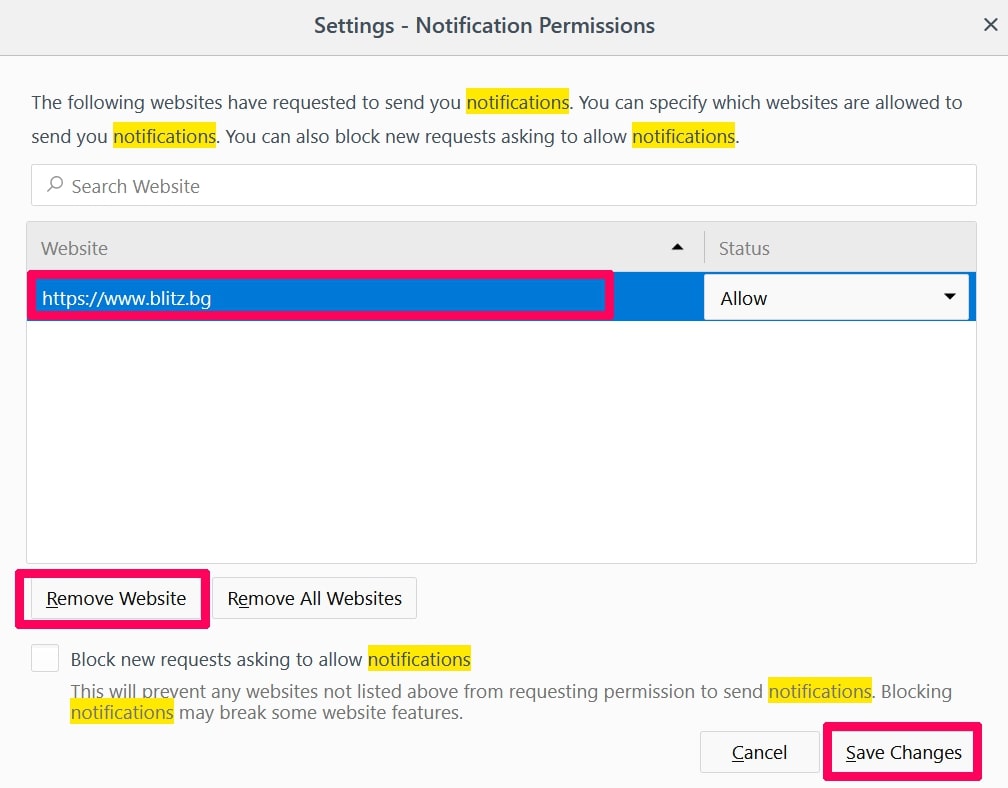
Stop Push Notifications on Opera
Step 1: In Opera, press ALT+P to go to Settings.

Step 2: In Setting search, type “Content” to go to Content Settings.
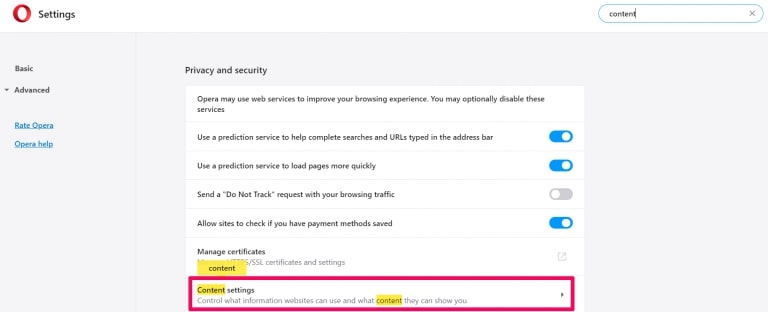
Step 3: Open Notifications:
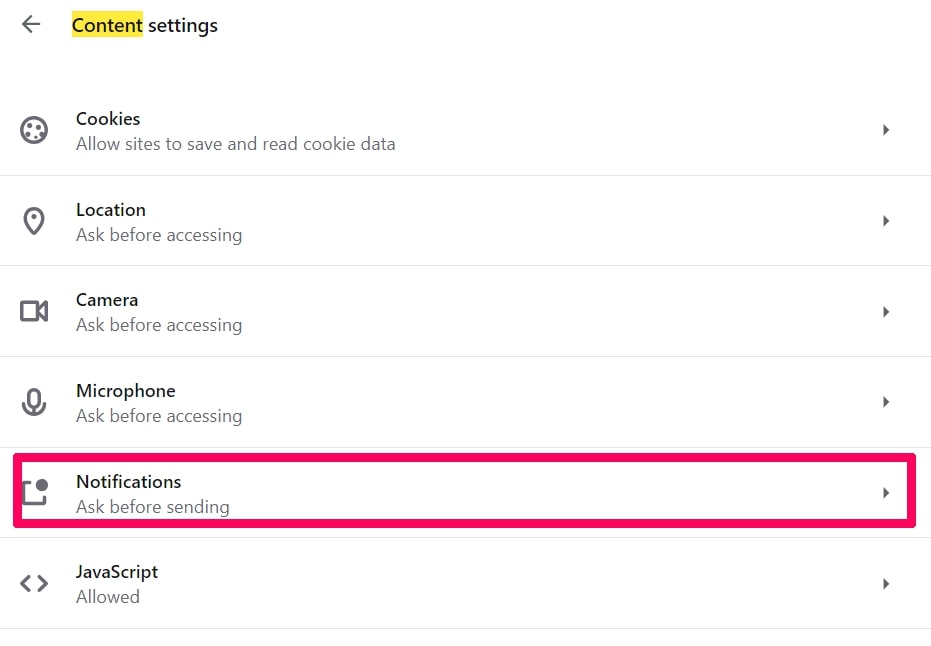
Step 4: Do the same as you did with Google Chrome (explained below):
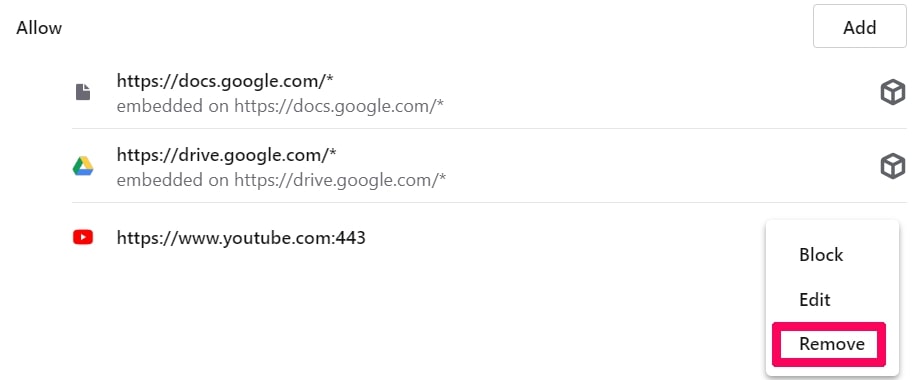
Eliminate Push Notifications on Safari
Step 1: Open Safari Preferences.
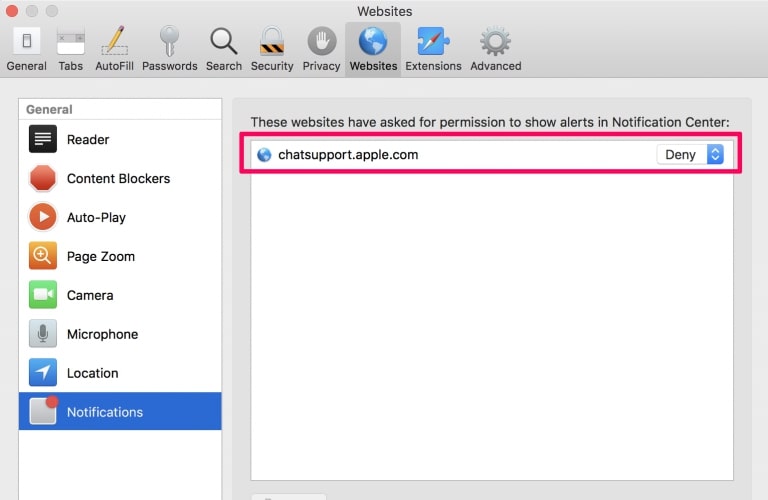
Step 2: Choose the domain from where you like push pop-ups gone and change to "Deny" from "Allow".
DNS Unlocker-FAQ
What Is DNS Unlocker?
The DNS Unlocker threat is adware or browser redirect virus.
It may slow your computer down significantly and display advertisements. The main idea is for your information to likely get stolen or more ads to appear on your device.
The creators of such unwanted apps work with pay-per-click schemes to get your computer to visit risky or different types of websites that may generate them funds. This is why they do not even care what types of websites show up on the ads. This makes their unwanted software indirectly risky for your OS.
What Are the Symptoms of DNS Unlocker?
There are several symptoms to look for when this particular threat and also unwanted apps in general are active:
Symptom #1: Your computer may become slow and have poor performance in general.
Symptom #2: You have toolbars, add-ons or extensions on your web browsers that you don't remember adding.
Symptom #3: You see all types of ads, like ad-supported search results, pop-ups and redirects to randomly appear.
Symptom #4: You see installed apps on your Mac running automatically and you do not remember installing them.
Symptom #5: You see suspicious processes running in your Task Manager.
If you see one or more of those symptoms, then security experts recommend that you check your computer for viruses.
What Types of Unwanted Programs Are There?
According to most malware researchers and cyber-security experts, the threats that can currently affect your device can be rogue antivirus software, adware, browser hijackers, clickers, fake optimizers and any forms of PUPs.
What to Do If I Have a "virus" like DNS Unlocker?
With few simple actions. First and foremost, it is imperative that you follow these steps:
Step 1: Find a safe computer and connect it to another network, not the one that your Mac was infected in.
Step 2: Change all of your passwords, starting from your email passwords.
Step 3: Enable two-factor authentication for protection of your important accounts.
Step 4: Call your bank to change your credit card details (secret code, etc.) if you have saved your credit card for online shopping or have done online activities with your card.
Step 5: Make sure to call your ISP (Internet provider or carrier) and ask them to change your IP address.
Step 6: Change your Wi-Fi password.
Step 7: (Optional): Make sure to scan all of the devices connected to your network for viruses and repeat these steps for them if they are affected.
Step 8: Install anti-malware software with real-time protection on every device you have.
Step 9: Try not to download software from sites you know nothing about and stay away from low-reputation websites in general.
If you follow these recommendations, your network and all devices will become significantly more secure against any threats or information invasive software and be virus free and protected in the future too.
How Does DNS Unlocker Work?
Once installed, DNS Unlocker can collect data using trackers. This data is about your web browsing habits, such as the websites you visit and the search terms you use. It is then used to target you with ads or to sell your information to third parties.
DNS Unlocker can also download other malicious software onto your computer, such as viruses and spyware, which can be used to steal your personal information and show risky ads, that may redirect to virus sites or scams.
Is DNS Unlocker Malware?
The truth is that PUPs (adware, browser hijackers) are not viruses, but may be just as dangerous since they may show you and redirect you to malware websites and scam pages.
Many security experts classify potentially unwanted programs as malware. This is because of the unwanted effects that PUPs can cause, such as displaying intrusive ads and collecting user data without the user’s knowledge or consent.
About the DNS Unlocker Research
The content we publish on SensorsTechForum.com, this DNS Unlocker how-to removal guide included, is the outcome of extensive research, hard work and our team’s devotion to help you remove the specific, adware-related problem, and restore your browser and computer system.
How did we conduct the research on DNS Unlocker?
Please note that our research is based on independent investigation. We are in contact with independent security researchers, thanks to which we receive daily updates on the latest malware, adware, and browser hijacker definitions.
Furthermore, the research behind the DNS Unlocker threat is backed with VirusTotal.
To better understand this online threat, please refer to the following articles which provide knowledgeable details.


